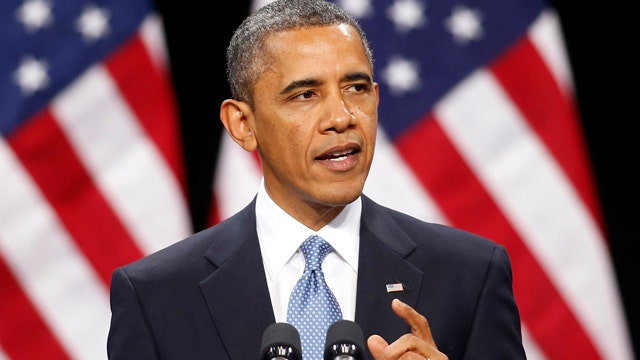Will Obama let Senate immigration plan go forward?
Sen. Jeff Flake weighs in on bipartisan proposal
Immigration reform is coming. Let's get it right.
What counts as getting it wrong? The 1986 Simpson-Mazzoli Act, signed by President Reagan. It granted amnesty to the then 3 million illegal immigrants and promised border enforcement.
Amnesty came. Enforcement never did. Reagan was swindled.
Americans are a generous people. They don't want 11 million souls living in fear among them. They would willingly, indeed overwhelmingly, support amnesty -- as long as it is the last. They don't want another Simpson-Mazzoli, another bait-and-switch that lets in another 11 million illegal immigrants -- and brings us back where we began.
[pullquote]
There is an obvious solution: enforcement first. Hence the attraction of the bipartisan Senate deal reached by the Gang of Eight, led by Democrat Chuck Schumer and Republicans John McCain and Marco Rubio. It is said to feature border enforcement first, then legalization.
Not quite.
It is true that only after some commission deems the border under control do illegal immigrants become eligible for green cards and, ultimately, citizenship. But this is misleading because on the day the president signs the reform -- long before enforcement even begins -- the 11 million are immediately subject to instant legalization.
It is cleverly called "probationary" legal status. But the adjective is meaningless. It grants the right to live and work here openly. Once granted, it will never be revoked. Consider:
Imagine that the border-control commission reports at some point that the border is not yet secure. Do you think for a moment that the 11 million will have their "probationary" legalization revoked? These are people who, in good faith, would have come out of the shadows, registered with the feds and disclosed their domicile and place of work. Do you think the authorities will have them fired, arrested and deported?
Inconceivable. "Probationary" in this context means, in reality, "forever." (Unless, of course, you commit some crime.) It means they can stay and work here freely for the rest of their lives.
True, they must await the "enforcement trigger" before they can apply for Green Cards. But they already have the functional equivalent of a Green Card. They got that on Day One. That matters more than anything to those living here illegally: the right to continue living here without fear. Forever. That's the very essence of amnesty.
And all this happens before the first scintilla of extra enforcement takes place. Which brings us to the second problem. What does this extra enforcement consist of?
When I heard McCain talk about (among other measures) new high-tech border control with advanced radar and drones, my heart sank. We've been here. In 2006, Congress threw a ton of money at a high-tech fence. Five years, $1 billion and a pathetic 53 (out of 2,000) miles later, Janet Napolitano canceled the program as a complete failure.
That was predictable. And some of us predicting it were pleading for something infinitely cheaper and simpler: a prosaic, low-tech fence. Of the kind built near San Diego (triple-layered) that resulted in an astounding 92 percent drop in apprehensions. Like the Israeli fence built along the West Bank that has reduced terrorist infiltration to practically zero.
There's a reason people have been building fences for, oh, 5,000 years. They work.
The current Senate proposal must be improved, either in the Senate or by the House. It's not complicated. Build the damn fence. And give "probationary legal status" to the 11 million -- not on the day the bill is signed but on the day the fence is completed. Have the president drive in the golden fence post at Promontory Point II and sign the amnesty right there. Great photo op.
With the sequencing -- and thus the incentives -- so properly aligned, I assure you the fence will go up with amazing alacrity. As it should. The point is not to punish anyone or to make things harder, but to ensure we don't have to do this again -- agonizing over the next 11 million cruelly living here in the shadows.
I know many Republicans are coming over to immigration reform because of the 2012 election results. Fine. I've been advocating this for seven years ("First a wall -- then amnesty," April 7, 2006). Welcome aboard.
But remember: Enforcement followed by legalization is not just the political thing to do. It is the right thing to do -- an act both of national generosity and national interest. It has long been the best answer to the immigration conundrum. It remains so.









































